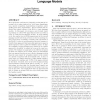Free Online Productivity Tools
i2Speak
i2Symbol
i2OCR
iTex2Img
iWeb2Print
iWeb2Shot
i2Type
iPdf2Split
iPdf2Merge
i2Bopomofo
i2Arabic
i2Style
i2Image
i2PDF
iLatex2Rtf
Sci2ools
203
Voted
CIKM
2011
Springer
2011
Springer
Focusing on novelty: a crawling strategy to build diverse language models
Word prediction performed by language models has an important role in many tasks as e.g. word sense disambiguation, speech recognition, hand-writing recognition, query spelling and query segmentation. Recent research has exploited the textual content of the Web to create language models. In this paper, we propose a new focused crawling strategy to collect Web pages that focuses on novelty in order to create diverse language models. In each crawling cycle, the crawler tries to fill the gaps present in the current language model built from previous cycles, by avoiding visiting pages whose vocabulary is already well represented in the model. It relies on an information theoretic measure to identify these gaps and then learns link patterns to pages in these regions in order to guide its visitation policy. To handle constantly evolving domains, a key feature of our crawler approach is its ability to adjust its focus as the crawl progresses. We evaluate our approach in two different scena...
| Added | 13 Dec 2011 |
| Updated | 13 Dec 2011 |
| Type | Journal |
| Year | 2011 |
| Where | CIKM |
| Authors | Luciano Barbosa, Srinivas Bangalore |
Comments (0)

